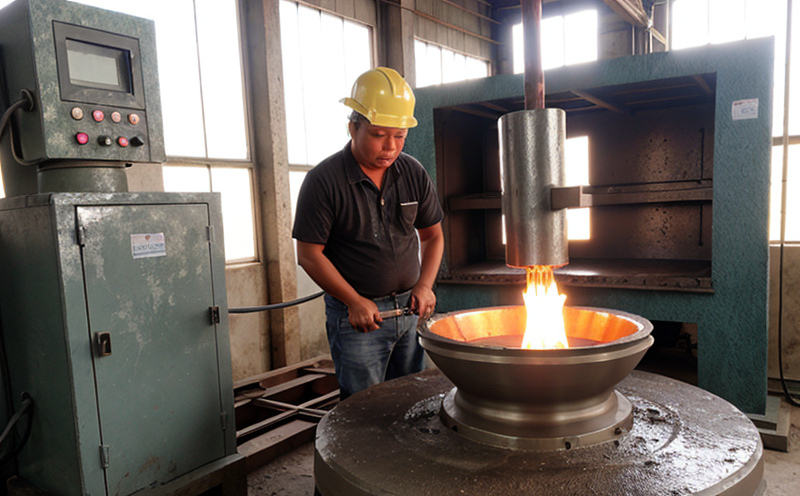ISO 8067 Cast Surface Hardness Testing
The ISO 8067 standard provides a method for testing cast surface hardness using the Rockwell C scale. This test is particularly important in industrial manufacturing and processing, where the quality of castings directly impacts product performance and reliability. Understanding the hardness properties of cast surfaces helps ensure that components meet stringent design specifications and withstand the stresses they will encounter during use.
The ISO 8067 method is widely used to assess the hardness of cast iron parts such as engine blocks, crankshafts, and gears. The test measures the indentation resistance of a sample by applying a standard force with a specific indenter (typically a diamond cone). The resulting hardness value provides critical information for quality control and process optimization.
For industrial manufacturing processes, ISO 8067 testing is essential because it helps manufacturers maintain consistent product quality. By adhering to this standard, companies can ensure that their castings meet the required mechanical properties, which are crucial for durability and performance in various applications. The test results also support compliance with regulatory requirements, enhancing brand reputation and customer satisfaction.
The Rockwell C scale is chosen for its ability to measure harder materials like cast iron, steel, and certain alloys. However, it’s important to note that the test should only be performed on flat or nearly flat surfaces of the casting. Specimen preparation involves ensuring the surface is clean and free from defects such as porosity, cracks, or excessive roughness.
When preparing a specimen for ISO 8067 testing, the following steps are typically followed:
- Clean the test area thoroughly to remove any dirt or debris.
- Ensure that the surface is dry and free from moisture.
- Position the indenter correctly on the surface of the casting. The indenter should be perpendicular to the surface for accurate readings.
The hardness value is obtained by observing the depth of the indentation made by the indenter after applying a specific force. This measurement is then converted into a Rockwell C scale number, which represents the hardness of the cast surface. Reporting these values allows manufacturers to monitor the quality of their production process and make adjustments as needed.
Compliance with ISO 8067 ensures that the testing method used is consistent with international standards, providing reliable and repeatable results. This consistency is crucial for maintaining product quality across different batches and locations. In addition, adherence to this standard enhances the credibility of a manufacturer's products in both domestic and international markets.
The application of ISO 8067 testing extends beyond just surface hardness; it also plays a role in research and development (R&D) efforts aimed at improving casting processes. By understanding how changes in alloy composition or cooling rates affect cast surface hardness, engineers can optimize production methods to achieve desired mechanical properties.
In conclusion, ISO 8067 Cast Surface Hardness Testing is an indispensable tool for quality assurance in industrial manufacturing and processing. Its role in ensuring product reliability and compliance with international standards makes it a vital component of any comprehensive testing strategy.
Applied Standards
| Standard Number | Description |
|---|---|
| ISO 8067:1995 | Method for determining the hardness of cast iron and steel by means of Rockwell C scale. |
| ASTM E140-18 | American Society for Testing Materials standard for testing hardness of metals using Rockwell scales. |
| EN 10025:2017 | European Norms providing specifications for structural steels, which often include castings subjected to ISO 8067 testing. |
The application of these standards ensures that the hardness testing process is consistent and reliable across different industries and regions. Compliance with these standards is essential for maintaining high-quality products and ensuring compatibility with international specifications.
Industry Applications
In industrial manufacturing, ISO 8067 Cast Surface Hardness Testing finds extensive use in various sectors, including automotive, aerospace, and heavy machinery. In the automotive industry, engine blocks and transmission components require precise hardness to ensure durability under high stress conditions. Similarly, in the aerospace sector, cast parts like turbine blades must withstand extreme temperatures and pressures without failure.
Heavy machinery manufacturers also rely on ISO 8067 testing to evaluate the hardness of critical components such as gears and shafts. These tests help identify potential weaknesses in the manufacturing process early on, allowing for corrective actions before mass production begins. By ensuring that each casting meets the required hardness levels, companies can enhance their product reliability and extend service life.
The aerospace industry places a premium on precision and safety, making ISO 8067 testing particularly important. Aerospace castings are subjected to rigorous testing to ensure they meet stringent mechanical property requirements. This testing not only enhances the performance of aircraft engines but also contributes to overall aviation safety by identifying any potential flaws in the casting process.
In summary, ISO 8067 Cast Surface Hardness Testing is a critical tool for ensuring product quality and reliability across multiple industries. Its application in automotive, aerospace, and heavy machinery manufacturing underscores its importance in maintaining high standards of performance and safety.
Customer Impact and Satisfaction
- Enhanced Product Quality: By adhering to ISO 8067 testing methods, manufacturers can ensure that their castings meet strict hardness requirements.
- Increased Customer Confidence: Meeting international standards increases customer trust in the quality of the products being supplied.
- Compliance with Regulations: Compliance with ISO and other relevant standards helps avoid legal issues related to non-conformance.
- Cost Efficiency: Early identification of defects through testing can lead to reduced rework costs and improved overall efficiency.
- Better Process Control: Continuous monitoring of hardness levels allows for more precise process control, leading to consistent product quality.
- Increased Market Access: Meeting international standards opens up new markets and opportunities for business expansion.
The impact of ISO 8067 testing on customer satisfaction is profound. Customers benefit from products that are reliable, safe, and meet the highest quality standards. This satisfaction translates into long-term relationships and repeat business for manufacturers who prioritize compliance with international norms.





